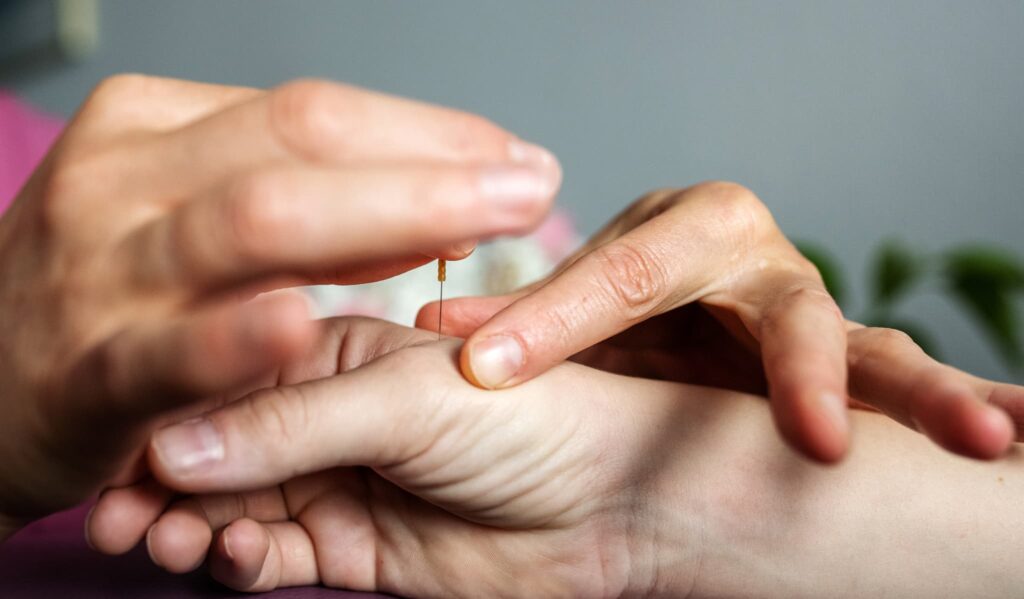
Acupuncture Points for Cough: Natural Relief Through Traditional Chinese Medicine
Coughing can be exhausting, making it difficult to focus, rest, or go about daily activities without discomfort. It is more than just a reflex. It is the body’s way of clearing irritants, mucus, or infections from the airways. When a cough lingers, it can leave a person feeling drained, disrupting sleep and making even simple conversations difficult. Over-the-counter medications may offer quick relief, but they often suppress symptoms rather than addressing the root cause.
Traditional Chinese Medicine views a cough as more than just an isolated issue. It is often a sign of an internal imbalance that needs to be corrected. Whether triggered by seasonal changes, dryness, excess phlegm, or deeper respiratory concerns, acupuncture provides a natural way to support the body’s healing process. By stimulating specific points, acupuncture helps ease throat irritation, clear congestion, and strengthen lung function for improved breathing. Cupping therapy is often used alongside acupuncture to promote circulation, release lung stagnation, and help the body clear mucus more effectively. Facial acupuncture can also play a role in respiratory health by improving sinus drainage and reducing inflammation that may contribute to a lingering cough. Clinics like ACA Acupuncture & Wellness offer these integrated treatments to restore balance, enhance lung function, and promote long-term respiratory health.
Understanding these options provides a holistic approach to managing a cough while supporting overall well-being in a way that conventional treatments may not.
How Acupuncture Helps Relieve Cough
Acupuncture is based on the principle of balancing Qi (energy flow) within the body. In TCM, the lungs play a vital role in governing respiration and immune defense. When lung Qi becomes blocked or weakened due to external pathogens (like viruses) or internal imbalances (such as dryness or phlegm accumulation), it can result in persistent coughing. Acupuncture works by stimulating certain meridians to:
- Reduce throat irritation and inflammation
- Clear excess phlegm and mucus buildup
- Strengthen lung Qi to prevent recurrent coughs
- Relax the chest muscles and ease breathing difficulties
Different types of coughs—whether dry, wet, or chronic—respond to different acupuncture points, which we will cover below.
Best Acupuncture Points for Cough Relief

1. LU7 (Lieque) – Strengthening the Lungs
Location: On the wrist, about 1.5 inches above the thumb joint.
How It Helps: LU7 is one of the most powerful points for relieving coughs, particularly those caused by external pathogens like wind-cold or wind-heat (common colds and flu). It helps expel phlegm, regulate lung function, and stop persistent coughing.
2. LU5 (Chize) – Clearing Mucus and Phlegm
Location: Inside the elbow crease.
How It Helps: LU5 is particularly effective for productive coughs with phlegm congestion in the chest. It helps clear excess mucus and soothes inflammation in the airways.
3. ST40 (Fenglong) – Draining Dampness and Phlegm
Location: On the lower leg, midway between the knee and ankle, on the outer side.
How It Helps: If your cough is accompanied by excess mucus or phlegm, ST40 is crucial for draining dampness from the lungs, reducing congestion, and restoring smoother breathing.
4. CV22 (Tiantu) – Relieving Throat Irritation
Location: In the center of the throat, just above the collarbone.
How It Helps: This point is effective for chronic, dry coughs or those causing throat tightness and irritation. It helps relax the throat muscles, making it easier to breathe and reducing coughing fits.
5. BL13 (Feishu) – Boosting Lung Qi
Location: On the upper back, about 1.5 inches from the spine, near the shoulder blades.
How It Helps: BL13 is one of the best acupuncture points for strengthening lung Qi, making it ideal for chronic coughs or weak immunity that leads to frequent respiratory infections.
6. KD6 (Zhaohai) – Moistening Dry Lungs
Location: On the inside of the ankle, just below the ankle bone.
How It Helps: If your cough is dry and persistent, KD6 helps nourish lung yin, reducing dryness in the throat and airways.
7. Dingchuan – Stopping Persistent Coughs
Location: Near the spine, just above the seventh cervical vertebra (C7).
How It Helps: This point is used to stop uncontrollable coughing, making it particularly helpful for asthma or bronchitis-related coughs.
Additional TCM Techniques for Cough Relief
While acupuncture is highly effective, combining it with other Traditional Chinese Medicine (TCM) practices can further enhance relief and promote faster recovery. These therapies work together to restore balance, strengthen lung function, and reduce inflammation associated with persistent coughing.
1. Herbal Remedies for Cough
TCM herbal formulas target specific types of cough by addressing underlying imbalances in the body:
- Xing Su San (Apricot Kernel and Perilla Leaf Powder): Best for dry coughs due to wind-cold, helping to moisten the lungs and reduce irritation.
- Er Chen Tang (Two Aged Decoction): Helps resolve damp-phlegm coughs, making it ideal for productive coughs with excessive mucus.
- Bai He Gu Jin Tang (Lily Bulb Decoction to Preserve Metal): Used for chronic, yin-deficient coughs with throat dryness and irritation.
These herbal formulations are often prescribed based on a person’s constitution and symptoms, so consulting a TCM practitioner ensures the best herbal remedy for your condition.
2. Cupping Therapy for Cough Relief
Cupping is a powerful adjunct therapy in TCM that helps clear congestion, improve lung function, and enhance circulation.
How It Works:
Cupping involves placing heated glass or silicone cups on the back to create a vacuum effect, which stimulates blood flow, removes toxins, and releases lung stagnation.
Best for Coughs Caused by:
- Chest congestion and phlegm buildup
- Chronic bronchitis and respiratory infections
- Weak lung Qi causing frequent coughing
Cupping on the upper back (near the BL13 Feishu point) is particularly effective for opening the lungs and relieving chest tightness, wheezing, and chronic coughs.
Tip: Mild redness or circular marks after cupping indicate improved circulation and detoxification, and they typically fade within a few days.
3. Acu-Facial Therapy for Respiratory Health
While Acu-Facial Therapy (Facial Acupuncture) is primarily known for skin rejuvenation, it also benefits respiratory function by improving circulation, reducing inflammation, and supporting lung health.
How Acu-Facial Helps with Cough:
- Stimulates facial meridians connected to the lungs, helping clear sinus congestion.
- Reduces inflammation in the throat and nasal passages to ease breathing.
- Enhances lymphatic drainage, which helps remove toxins and allergens contributing to coughing.
- Relaxes the nervous system, promoting overall immune support and reducing stress-induced coughs.
Acu-Facial therapy can be combined with body acupuncture for a comprehensive TCM approach to cough relief and respiratory health.
4. Dietary Adjustments for Cough Prevention

TCM emphasizes the role of diet in maintaining lung health. Making targeted food choices can help prevent and manage coughs effectively.
For Dry Coughs:
- Eat pears, honey, white fungus, and almonds to moisten the lungs.
- Drink warm herbal teas with licorice root and ginger.
For Phlegm-Heavy Coughs:
- Avoid dairy, fried foods, and excessive sugar, which increase mucus production.
- Consume radish, scallions, and citrus peels to help clear dampness and phlegm.
TCM Tip: Warm soups and congee with ginger and jujube dates help nourish the body while promoting gentle detoxification and lung support.
Causes of Cough in Traditional Chinese Medicine (TCM)
TCM categorizes coughs based on their underlying imbalance. Understanding the root cause helps determine the best acupuncture points and treatments for relief.
1. External Pathogens (Wind-Cold & Wind-Heat)
- Wind-Cold: Often linked to seasonal colds, flu, and viral infections. Symptoms include a runny nose, chills, sneezing, and a wet cough with clear mucus.
- Wind-Heat: Related to infections and inflammation, leading to a sore throat, fever, yellow mucus, and a dry, hacking cough.
2. Internal Imbalances
- Lung Qi Deficiency: Weak lung energy can cause chronic coughs, fatigue, and frequent respiratory infections.
- Yin Deficiency: Leads to dry coughs, night sweats, and throat irritation—often seen in long-term smokers or those with chronic bronchitis.
- Damp-Phlegm Accumulation: Causes productive coughs with thick mucus, chest congestion, and difficulty breathing.
3. Environmental & Lifestyle Factors
- Pollution & Allergens: Airborne irritants can trigger chronic coughing.
- Smoking & Secondhand Smoke: Harms lung function and increases coughing frequency.
- Poor Diet: Excessive dairy, sugar, and greasy foods can lead to mucus buildup and phlegm-heavy coughs.
- Stress & Emotional Imbalance: TCM associates emotions with organ health—grief and sadness can weaken lung Qi, contributing to persistent coughing.
Risk Factors for Chronic Cough
While a cough is usually temporary, some factors increase the likelihood of developing chronic or recurrent coughing. Identifying and addressing these risk factors can help reduce symptoms and prevent long-term respiratory issues. Ignoring persistent coughing may lead to further complications, affecting daily comfort and overall lung health.
1. Weakened Immune System
People with low immunity are more susceptible to infections that lead to persistent coughing. Frequent illnesses or a slow recovery from colds and flu can make the respiratory system more vulnerable. Strengthening the immune system through proper nutrition, rest, and acupuncture can help reduce the frequency of respiratory issues.
2. Asthma & Respiratory Conditions

Individuals with asthma, bronchitis, or chronic obstructive pulmonary disease (COPD) experience frequent coughing due to airway inflammation. Symptoms may worsen with physical activity, allergens, or seasonal changes. Managing inflammation through acupuncture and TCM practices may help regulate breathing and reduce chronic coughing episodes.
3. Exposure to Irritants
Dust, smoke, mold, and pollution can irritate the lungs and cause chronic coughing. Long-term exposure to environmental toxins, such as chemicals or industrial pollutants, may also contribute to respiratory discomfort. Reducing exposure to irritants and incorporating lung-strengthening techniques, such as deep breathing exercises, can support respiratory function.
Dry air worsens throat irritation, leading to persistent coughs. Using a humidifier or staying hydrated can help maintain moisture in the airways. Herbal remedies in Traditional Chinese Medicine are often used to nourish and protect the lungs in dry conditions.
4. Acid Reflux (GERD)
Gastroesophageal reflux disease (GERD) can cause stomach acid to reach the throat, triggering a dry, persistent cough. Symptoms may worsen after eating, when lying down, or during the night, making proper dietary habits and lifestyle changes essential for relief. Acupuncture and herbal medicine can help regulate digestion and reduce acid reflux, addressing the root cause of reflux-induced coughing.
Prevention Tips: How to Reduce the Risk of Coughing

Preventing coughs involves strengthening the lungs and minimizing exposure to irritants. Here’s how you can protect yourself:
1. Strengthen Lung Qi with Acupuncture & Herbal Remedies
- Regular acupuncture treatments can improve respiratory function and reduce cough frequency.
- Herbs like ginger, licorice root, and astragalus boost immunity and lung health.
2. Improve Indoor Air Quality
- Use an air purifier to remove allergens and pollutants.
- Maintain proper humidity levels to prevent dry air irritation.
3. Eat a Lung-Friendly Diet
- Consume pears, honey, and almonds to moisten the lungs.
- Avoid dairy, sugar, and fried foods, which increase phlegm production.
4. Manage Stress & Emotions
- Deep breathing exercises and meditation help prevent lung Qi stagnation.
- Emotional balance is key in preventing TCM-related imbalances leading to coughing.
Exploring Natural Relief Through TCM
For those seeking lasting relief, acupuncture and complementary TCM therapies provide a natural way to support respiratory health. Exploring these approaches can help ease discomfort, restore balance, and promote overall well-being. Coughs can be persistent and frustrating, but addressing the underlying imbalances rather than just the symptoms offers a more sustainable solution. With options like acupuncture, cupping therapy, and facial acupuncture, there are multiple ways to support lung function and improve breathing naturally. Taking a proactive approach to respiratory health can make a significant difference in both recovery and long-term wellness.
